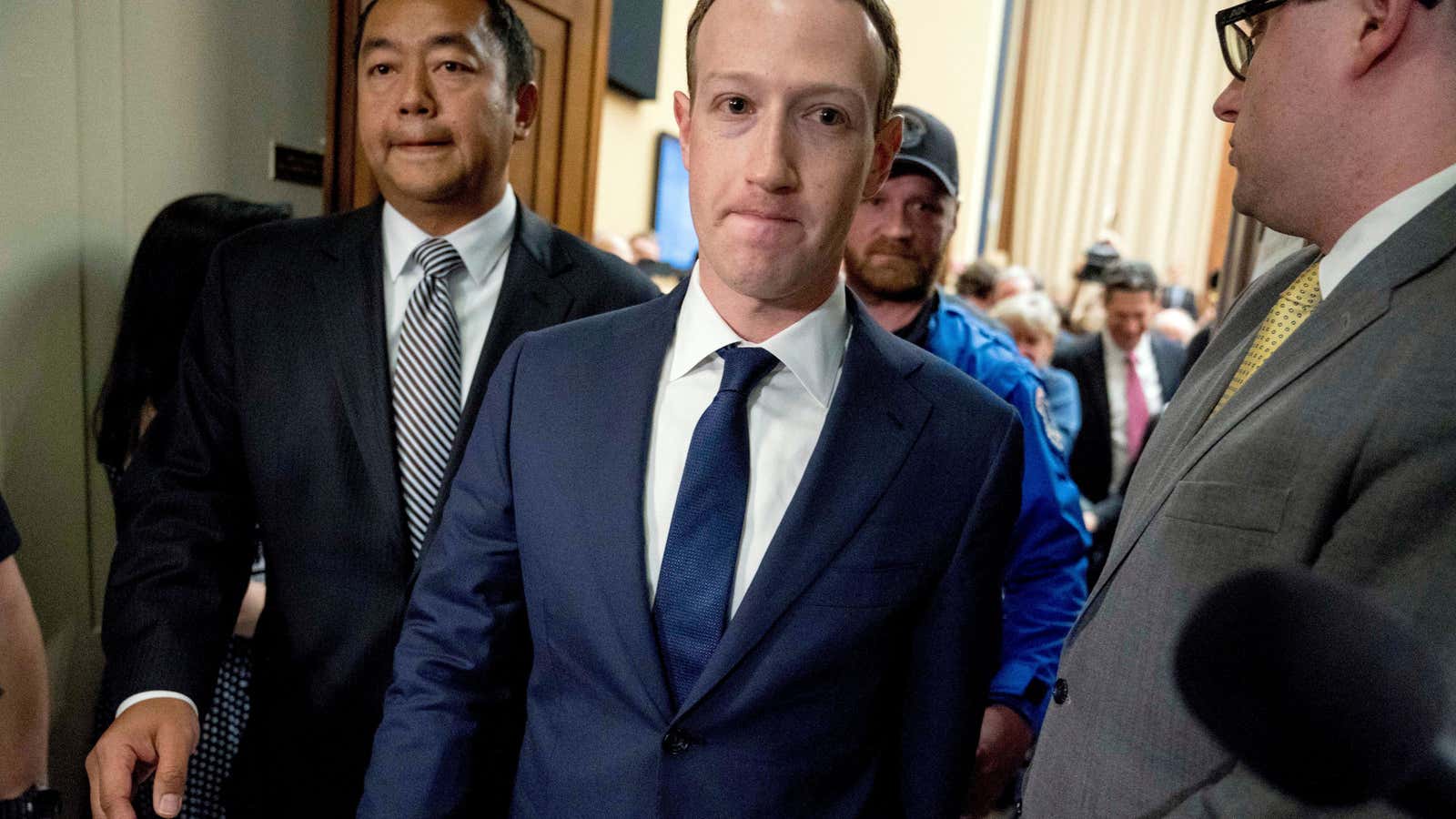Facebook posted its first earnings since the biggest scandal in the company’s 14-year history today (April 25), once again displaying a Teflon-like ability to repel just about any bad press.
The company generated $11.97 billion in first-quarter revenue, a 49% jump over the first quarter of 2017. That marks the second-strongest quarter in Facebook’s history, and its strongest first quarter ever. Analysts had expected the company to generate around $11.4 billion.
Facebook’s income rose by 63% to $4.99 billion from $3.06 billion last year. Revenue fell by about $1 billion over the previous quarter, but that’s not unusual, given advertisers tend to spend the most during fourth-quarter holiday season.
“Despite facing important challenges, our community and business are off to a strong start in 2018,” CEO Mark Zuckerberg said in a release. “We are taking a broader view of our responsibility and investing to make sure our services are used for good. But we also need to keep building new tools to help people connect, strengthen our communities, and bring the world closer together,” he added, repeating his favorite refrains.
Mobile advertising contributed to the company’s massive growth, accounting for 91% of its overall ad revenue, up from 85% in the first quarter of 2017.
Perhaps the biggest surprise is the growth in Facebook’s user base, despite #deleteFacebook, a movement spurring users to leave the social network and recently energized by the Cambridge Analytica scandal. Monthly active users grew over the last quarter, reaching 2.2 billion worldwide. Daily active users also increased, including in Facebook’s most popular market: the US and Canada, where the company saw its first-ever decline last quarter. Facebook also said it expects active users in Europe to fall or flatten in the next quarter, once the new General Data Protection Regulation (GDPR) advertising and privacy rules go into effect in the region on May 25.
The company is still adding monthly users right now, but at a slower pace, which is unsurprising considering how many people are already on Facebook. More than half of all internet users are currently registered on the platform.
It could be too soon to judge the full impact of the Cambridge Analytica scandal; as some analysts have noted, advertisers have long been locked in to campaigns that would have run through the end of this quarter. But the lack of user exodus suggests that everything will be just fine for the social network. “If users aren’t leaving en masse, advertisers will continue to utilize the Facebook platform to sell their products and services,” Haris Anwar, a senior analyst at Investing.com, said in a note before the company reported earnings.
Facebook’s expenses will continue to grow as it invests in security and other efforts. “Beyond the investments we’re making to secure our platform, we’re going to invest even more in building the experiences that bring people together on Facebook in the first place,” Zuckerberg said.
US users continue to far outpace other regions’ in generating revenue for Facebook, but chief financial officer Dave Wehner said during the earnings call that user growth is largely driven by India, Indonesia, and Vietnam. The company may have to look beyond advertising if it wants to more effectively monetize its non-Western users.
While Facebook’s stock price took a big hit in recent months, that didn’t appear to affect its overall health. Zuckerberg’s performance in Congress appeased investors, and today’s earnings report will do more to boost their confidence. “At first look, we would characterize [the first-quarter] results as a relief and a sign that so far the damage from Cambridge appears contained,” analyst Daniel Ives of GBH Insights said in a note to investors. “Although this will be a long three-six months ahead to steer through this storm.”
Investors’ relief was evident in the company’s stock performance following the earnings report. The company’s share price was up about $11, or 7%, to $171 in after-hours trading.
Still, one of the more important indicators of the company’s future is potential action from regulators. To that end, the most significant threat Facebook faces at the moment is a crackdown from the US Federal Trade Commission, should the regulator find that the company violated its 2011 consent decree.
Said Anwar, “I don’t think another blow-out quarter is going to be enough to erase the uncertainty currently hovering around Facebook shares.”
